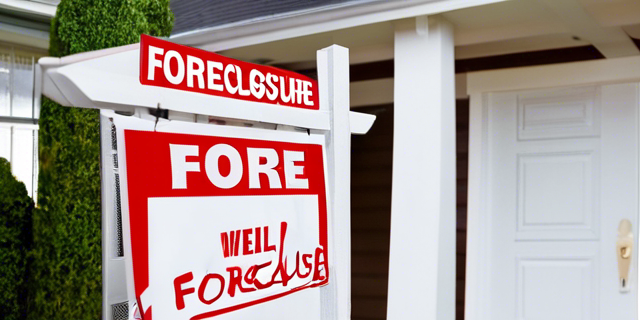How to Avoid Foreclosure due to Mortgage Debt 2024

Facing the prospect of foreclosure can be an overwhelming and stressful experience. Losing your home due to mortgage debt is a situation no homeowner wants to find themselves in. However, there are steps you can take to potentially avoid foreclosure and keep a roof over your head. In this article, we’ll explore various strategies and options available to help you navigate this challenging situation.
Understanding Foreclosure
Before we delve into the strategies to avoid foreclosure, it’s essential to understand what foreclosure entails. Foreclosure is a legal process initiated by a lender or mortgage company when a homeowner fails to make their mortgage payments. The lender can seize the property and sell it at auction to recover the outstanding debt.
Foreclosure can have severe consequences, including damage to your credit score, difficulties in securing future financing, and the potential loss of equity in your home. Therefore, it’s crucial to take proactive measures to prevent foreclosure from occurring.
1. Communicate with Your Lender
The first and most crucial step in avoiding foreclosure is to communicate with your lender. As soon as you realize you’re facing financial difficulties that may impact your ability to make mortgage payments, reach out to your lender. Many lenders are willing to work with homeowners to find a mutually beneficial solution, provided you’re proactive and transparent about your situation.
By maintaining open lines of communication, you can explore various options, such as loan modifications, forbearance agreements, or repayment plans, which can help you get back on track with your mortgage payments.
2. Evaluate Your Financial Situation
Take a close look at your current financial situation and identify areas where you can potentially cut expenses or increase your income. Create a budget and prioritize your expenses, ensuring that your mortgage payment is at the top of the list. Consider taking on a part-time job, selling assets, or reducing discretionary spending to free up funds for your mortgage payments.
3. Explore Loan Modification Options
If your financial hardship is temporary, you may be eligible for a loan modification. A loan modification is a permanent change to the terms of your mortgage, such as reducing the interest rate, extending the loan term, or converting a portion of the principal balance into a non-interest-bearing balance. [Loan modifications from the U.S. Department of Housing and Urban Development (HUD)](https://www.hud.gov/topics/avoiding_foreclosure/loanmodifi cation) can provide much-needed relief and make your mortgage payments more manageable.
4. Consider Forbearance Agreements
If your financial difficulties are short-term, you may be able to negotiate a forbearance agreement with your lender. A forbearance agreement is a temporary suspension or reduction of your mortgage payments for a specific period, typically three to six months. During this time, you can work on resolving your financial issues without the threat of foreclosure looming over your head.
5. Explore Mortgage Assistance Programs
Various government and non-profit organizations offer mortgage assistance programs designed to help struggling homeowners avoid foreclosure. These programs may provide temporary financial assistance, counseling, or legal aid. Some popular programs include the Making Home Affordable program and the Hardest Hit Fund from the U.S. Department of the Treasury.
6. Seek Guidance from Housing Counselors
Housing counselors are professionals who can provide valuable guidance and advice on navigating the foreclosure process. They can help you understand your rights and options, negotiate with lenders, and explore various assistance programs. Organizations like NeighborWorks America and the National Foundation for Credit Counseling offer free or low-cost housing counseling services.
7. Explore Refinancing Options
If your financial situation is stable, but you’re struggling with your current mortgage payments, refinancing your mortgage may be an option. Refinancing involves replacing your existing mortgage with a new loan, ideally with better terms, such as a lower interest rate or extended repayment period. This can potentially lower your monthly payments and make them more manageable.
8. Consider Selling Your Home
While it may not be an ideal solution, selling your home can be a viable option to avoid foreclosure. If you have equity in your home, selling it can help you pay off your outstanding mortgage balance and potentially walk away with some funds to start fresh. However, it’s important to carefully evaluate the housing market and consult with a real estate professional to ensure you receive a fair price for your home.
9. Seek Legal Assistance
If you’re facing foreclosure and have exhausted all other options, it may be wise to seek legal assistance. An experienced foreclosure attorney can review your case, advise you on your rights, and potentially help you negotiate with your lender or challenge the foreclosure process in court.
10. Beware of Foreclosure Rescue Scams
Unfortunately, foreclosure situations can attract unscrupulous individuals or companies offering “foreclosure rescue” services. Be wary of any unsolicited offers or companies that require upfront fees or ask you to sign over the deed to your home. These can often be scams designed to take advantage of your vulnerable situation. Always consult with reputable housing counselors or attorneys before engaging with any foreclosure rescue services.
11. Prioritize Your Living Situation
While avoiding foreclosure should be a priority, it’s also important to consider your living situation. If your financial hardship is severe and long-term, it may be more practical to explore alternative housing options, such as renting or downsizing to a more affordable property. This can help alleviate the stress and financial burden of maintaining a home you can no longer afford.
12. Rebuild Your Finances
Regardless of the outcome, it’s crucial to take steps to rebuild your finances after facing foreclosure or financial hardship. This may involve creating a budget, reducing expenses, paying off outstanding debts, and rebuilding your credit score. Seek guidance from financial advisors or credit counselors to develop a solid plan for regaining financial stability.
13. Stay Positive and Persevere
Facing foreclosure can be emotionally and mentally draining. It’s important to stay positive and persevere through this challenging time. Surround yourself with a support system of friends, family, or professionals who can provide encouragement and guidance. Remember that foreclosure is not the end of the road, and with determination and the right strategies, you can overcome this obstacle and work towards a brighter financial future.
14. Learn from the Experience
While going through the foreclosure process is undoubtedly difficult, it can also serve as a valuable learning experience. Reflect on the circumstances that led to your financial hardship and identify areas where you can improve your financial literacy and decision-making. This knowledge can help you make more informed choices in the future and prevent similar situations from occurring.
15. Explore Alternative Housing Options
If all efforts to avoid foreclosure have been exhausted, it’s important to explore alternative housing options. This may include renting an apartment or house, staying with family or friends temporarily, or seeking assistance from local shelters or organizations. While losing your home is never easy, having a plan for your next living situation can provide a sense of stability and security.
Conclusion
Facing foreclosure due to mortgage debt can be an overwhelming and stressful experience, but it’s important to remember that you have options. By taking proactive steps, communicating with your lender, exploring assistance programs, and seeking guidance from professionals, you can increase your chances of avoiding foreclosure and protecting your home. Remember, foreclosure is not the end of the road, and with perseverance and the right strategies, you can overcome this challenge and work towards a brighter financial future.
FAQs
1. What is the first step I should take if I’m struggling to make my mortgage payments? The first step should be to communicate openly and honestly with your lender. Lenders are often willing to work with homeowners who are proactive and transparent about their financial situation. By reaching out early, you can explore various options and solutions before falling too far behind on your payments.
2. Can a loan modification really help me avoid foreclosure? Yes, a loan modification can be an effective way to avoid foreclosure. By modifying the terms of your mortgage, such as reducing the interest rate, extending the loan term, or converting a portion of the principal balance into a non-interest-bearing balance, your monthly payments can become more manageable and affordable.
3. What if my financial hardship is only temporary? Can I still avoid foreclosure? If your financial hardship is temporary, you may be able to negotiate a forbearance agreement with your lender. This allows you to temporarily suspend or reduce your mortgage payments for a specific period, typically three to six months, giving you time to get back on your feet without the threat of foreclosure.
4. Are there any government programs that can help me avoid foreclosure? Yes, there are various government and non-profit organizations that offer mortgage assistance programs designed to help struggling homeowners avoid foreclosure. Some popular programs include the Making Home Affordable program and the Hardest Hit Fund from the U.S. Department of the Treasury.
5. If I can’t avoid foreclosure, what options do I have for alternative housing? If you have exhausted all efforts to avoid foreclosure, you may need to explore alternative housing options. This could include renting an apartment or house, staying with family or friends temporarily, or seeking assistance from local shelters or organizations. While losing your home is never easy, having a plan for your next living situation can provide a sense of stability and security.

